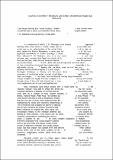Custom in context : Medieval and Early Modern Scotland and England
Abstract
Studying custom and its context gives unique insights into relations of property, production and law in a society. The first part of the article discusses meaning in Scotland, focusing on ‘custom as normative practice, custom as unwritten law, and custom in opposition to law’. The second seeks to demonstrate (using evidence focusing principally on landholding) that custom as legal currency was more restricted for Scots than English. The third sets out the implications for continuity of landholding and for agrarian change in the Highlands of Scotland, an area where custom might be thought strong. The fourth deals with the differential legal development of Scotland and England between the twelfth and eighteenth centuries and its effects on social and tenurial relationships. A final section suggests why custom mattered more as a resource to the English, the domains in which it was important to Scots and the implications for understanding the comparative development of the two societies since the Middle Ages.
Citation
Houston , R 2011 , ' Custom in context : Medieval and Early Modern Scotland and England ' , Past & Present , vol. 211 , no. 1 , pp. 35-76 . https://doi.org/10.1093/pastj/gtq064
Publication
Past & Present
Status
Peer reviewed
ISSN
0031-2746Type
Journal article
Collections
Items in the St Andrews Research Repository are protected by copyright, with all rights reserved, unless otherwise indicated.

